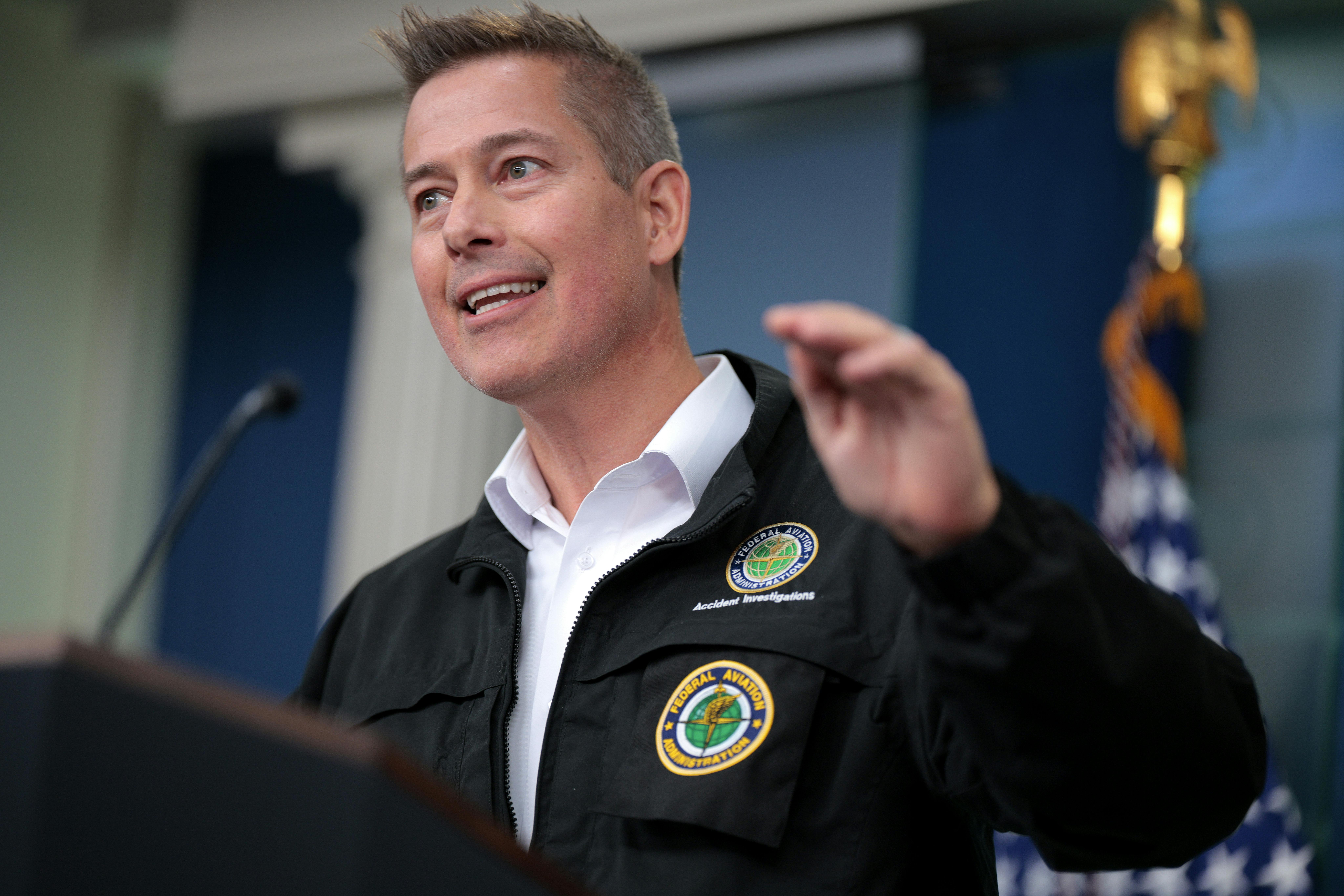Sean Duffy’s War On Transportation Safety

The Trump administration may wind up doing more to discourage flying than climate activist Greta Thunberg has. Within a week of Donald Trump’s inauguration, two separate plane crashes in major U.S. cities killed 74 people. Investigations into the D.C. and Philadelphia crashes are ongoing, but have raised fears about the safety of the country’s air traffic.
Attempting to allay these concerns, current transportation secretary and former reality TV show personality-turned-Congressman-turned-Fox Business-host Sean Duffy said in a January 30 news conference that “you’re safe” flying within the U.S. He added that the United States has “the safest airspace in the world.” Like a number of his White House colleagues, Duffy—who’s got virtually no experience with either transportation issues, or handling a $110 billion budget—has cast at least partial blame for the crash onto the Biden administration and its diversity, equity and inclusion (DEI) initiatives. “They were focused on changing the name from ‘cockpit’ to ‘flight deck’ or ‘notice to airmen,’ they wanted to change it to ‘notice to air mission,’” Duffy told CNN’s Jake Tapper on Sunday, referencing the Federal Aviation Administration’s management under President Biden. “They focused on EVs and sustainability and racist roads, things that don’t matter in regards to safety.”
This argument, which reporters have found no evidence to support, offers a window into a wider strategy taking shape within both the broader administration and the Department of Transportation, in particular. As Duffy’s Department of Transportation chides the Biden administration for prioritizing “woke” policies over “safety, efficiency, economic prosperity, and regulatory reform,” its own preoccupation so far shows seems to be demonstrating that it is “anti-woke.”
Among Duffy’s first acts in office was an order indicating that DoT lending, grantmaking and contracting should prioritize communities with “marriage and birth rates higher than the national average.” The language of that and another sweeping memo signal the department may try to withdraw funding to cities and states for such infractions as issuing “vaccine and mask mandates,” or failing to collaborate with federal immigration authorities by creating sanctuary cities. The upshot of all this is that parts of the country which aren’t in lock-step with Trump’s agenda could find it even harder to keep their roads and mass transit systems in safe, working order.
While recent plane crashes have triggered concerns about air safety, car travel remains far more deadly. As Kea Wilson wrote for Streetsblog, the recent DoT memo’s “commitment to ‘the accessibility of transportation to families with young children’ might sound benign—until you consider that truly doing so would require confronting the devastating cost of universal car dependence on American families, something neither Duffy nor Trump is proposing.”
Relatedly, the department’s first press release after Duffy’s confirmation, issued on January 28, announced his first action on the job: “signing a memorandum directing staff to start the process of resetting Corporate Average Fuel Economy (CAFE) standards, which will ultimately lower the price of a car for American consumers and eliminate the electric vehicle mandate.” It’s an odd claim. Fuel economy standards require that the vehicles carmakers sell use fuel more efficiently, i.e. that they get more mileage per gallon of gas. The so-called “electric vehicle mandate” put in place by the Biden administration doesn’t mandate that automakers sell a certain number or percentage of electric vehicles, or prevent consumers from buying gas-powered ones. DoT estimated that the incremental improvements in fleet-wide fuel economy that those rules require will save passenger car and light truck drivers more than $600 over the lifetime of their vehicles. Heavy-duty pickup and van owners are estimated to save more than $700.
Duffy, by contrast, calls the rules “burdensome and overly restrictive,” arguing they’ve “needlessly driven up the cost of a car in order to push a radical Green New Deal agenda.” Car prices have indeed risen over the last several years, but the Biden administration’s new CAFE standards—finalized last June—don’t seem to have much to do with it. Aside from the price pressures of supply chain constraints and rising interest rates, U.S. automakers have spent decades specializing in making bigger and more expensive cars—in part to skirt fuel economy regulations and boost profit margins. White House policy may well send the price of cars soaring even further. While on hold for now, Trump’s proposed 25 percent tariffs on goods from Mexico and Canada threaten to raise the cost of new cars by anywhere from $1,000 to $9,000. While in Congress, Duffy led an effort to strengthen Trump’s tariff powers.
Part of the exorbitant cost of car ownership, moreover, is the skyrocketing price of car insurance. The cost of full coverage car insurance rose by more than 25 percent nationwide in 2024, and by more than 40 percent in some stats. Drivers in Nevada, Michigan, Florida and Louisiana now spend more than 5 percent of their income on car insurance premiums on average.
During his time in Congress, insurance interests were Sean Duffy’s top campaign contributors. Duffy—who served on the House Financial Services Subcommittee on Housing, Community Development, and Insurance—raked in $887,612 from political action committees linked to the insurance industry from 2009 to 2020. He received $49,500 from American Property Casualty Insurance Association, a trade lobby for home, auto and business insurers. The National Association of Mutual Insurance Companies issued a glowing endorsement of Duffy as he went through confirmation hearings. In a letter to the leadership of the Senate Commerce Committee, NAMIC’s senior vice president of federal and political affairs wrote that the lobby “had the privilege of working with Representative Duffy on several initiatives of great importance to our members and their policyholders,” having named him their Federal Legislator of the Year in 2017.
With Elon Musk continuing to purge the federal workforce, U.S. transportation networks—whose workers are already stretched to their limits—could soon become even less functional than they already are. That Duffy meanwhile seems to be treating his cabinet post like a never-ending Fox News segment doesn’t inspire much confidence that more planes won’t fall out of the sky.


